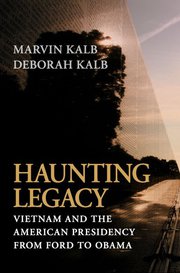Q&A with Professor Andrew J. Bacevich
 Saturday, May 18, 2013 at 8:16AM
Saturday, May 18, 2013 at 8:16AM  Andrew J. Bacevich is Professor of International Relations and History at Boston University. His books include The New American Militarism, Washington Rules, and The Limits of Power. A West Point graduate, he served in the U.S. Army for two decades, including in Vietnam, retiring with the rank of colonel.
Andrew J. Bacevich is Professor of International Relations and History at Boston University. His books include The New American Militarism, Washington Rules, and The Limits of Power. A West Point graduate, he served in the U.S. Army for two decades, including in Vietnam, retiring with the rank of colonel.
Q: You write in The New American Militarism, "Vietnam provides the frame of reference within which I interpret much else." In the post-Vietnam era, how big a role do you think the Vietnam legacy played when U.S. leaders faced decisions about sending troops into battle?
A: Although an oversimplification, George H. W. Bush's claim that with the 1991 Persian Gulf War, the United States had "kicked the Vietnam syndrome" is more right than wrong. Before Desert Storm, expectations that intervention would almost necessarily result in a Vietnam-like quagmire hamstrung proponents of military action. Desert Storm gave the interventionists a counterargument: Look, the military knows how to win, quickly, decisively, and economically.
Of course, that turned out to be a great misreading of events. Bush's victory turned out to be far less conclusive than it appeared at the time. The principal result of Desert Storm was to draw the United States military more deeply into a situation it did not understand and could not control. "Victory" over Saddam Hussein in 1991 presaged more war.
Q: What impact did the Powell doctrine have on the development of the "new American militarism" that you describe?
A: General Powell intended his doctrine to reaffirm the terms of the Weinberger Doctrine, which had sought to prevent any recurrence of Vietnam. Both Powell and Weinberger expressed concerns widely-held in the officer corps after Vietnam: don't send us to fight unless it's really important and unless you're serious and mean to win.
Whatever the merits of that view, it could not withstand the chest-thumping, world's-only-superpower mood to which Washington and much of the country succumbed in the 1990s. Having "won" the Cold War and having "vanquished" Saddam Hussein, the United States pretty much reached the conclusion that the world was now marching to an American drumbeat. Given such a mood, cautionary warnings were not welcome. So the 1990s became a decade of unprecedented interventionism, with the Powell Doctrine swept aside.
Q: In Washington Rules, you describe the November 1963 overthrow of South Vietnamese leader Ngo Dinh Diem as "a historical turning point," adding, "Once Diem passed from the scene, the situation in South Vietnam quickly went from awful to far worse." Why was that such a significant event, and what other events during the war would you consider equally important as turning points?
A: Complicity in Diem's overthrow made the U.S. commitment to South Vietnam all but irreversible. Recall that Washington knew of efforts by Diem's brother Nhu to cut a deal with the north. One purpose of the coup was to prevent any such Vietnamese solution to the problem posed by Vietnam.
By deposing Diem, we made it "our" war. But the ensuing political chaos meant that the only way to fight "our" war was with "our" troops. So the Americanization of the war became all but inevitable. I say "all but" because in theory President Johnson could have abandoned South Vietnam after he won election in 1964, but the political cost of doing so would have been very high indeed.
There's no doubt that the Tet Offensive of 1968 marks a turning point of comparable significance. That's when the full implications of Johnson's error in Americanizing the war came home to all.
Q: While the Vietnam War "threatened to discredit" the national security consensus, the "Washington Rules" survived, you write. Why were they strong enough to withstand the negative consequences of the war?
A: As I have observed elsewhere, the Washington Rules may not serve the country's interests, but they certainly serve the interests of powerful institutions such as the national security apparatus and the military-industrial-congressional complex. There's money to be made, ambitions to be pursued, campaign contributions to be collected, and constituents to be satisfied. So satisfying narrow, immediate concerns trumps any concern for the overall well-being of the nation.
Q: What are you working on now?
A: I've got a new book coming out in September. It's called Breach of Trust: How Americans Failed Their Soldiers and Their Country. It argues that the abandonment of the citizen-soldier tradition after Vietnam in favor of our professional army was a huge mistake, harmful to soldiers and harmful to the nation as a whole. It argues for reinstituting the principle that contributing to the country's defense should be an obligation inherent in citizenship.
--Interview with Deborah Kalb. This interview is also posted at deborahkalbbooks.blogspot.com.




